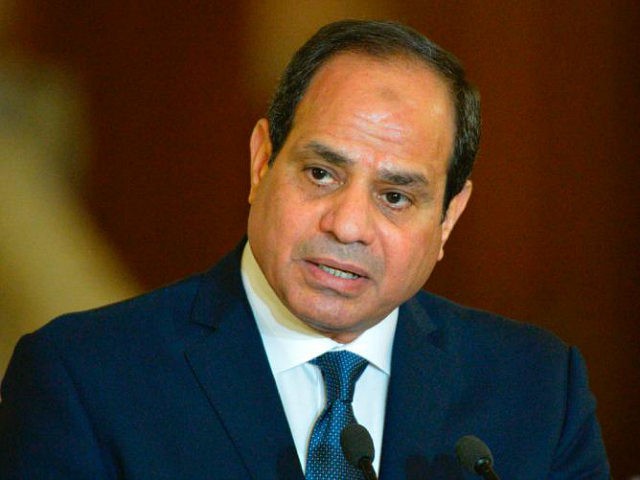Egyptian President Abdel-Fattah el-Sisi said this week that his government desires peace and stability in neighboring Libya, but might be prepared to intervene with military force to protect Egypt’s western border and thwart the ambitions of Turkey and its militia allies.
Speaking at the dedication of a new base over the weekend, Sisi told Egyptian military personnel they should be ready for combat missions beyond Egypt’s borders, pointedly including Libya as a theater where Egyptian national security interests are threatened.
Sisi said Egypt has a legitimate right to intervene in Libya to defend its western border if Turkish forces and allied Libyan militia cross a “red line” between the cities of Sirte and Jufra. He spoke of Egyptian military intervention as though it were all but inevitable, warning that “those who interpreted our patience as weakness are mistaken” and promising Egyptian forces would withdraw “peacefully” after ensuring the “stability and security” of Libya.
Sirte is a stronghold for the Libyan National Army (LNA), the faction headed by General Khalifa Haftar and supported by Egypt, while Jufra is the location of an important LNA airbase.
The LNA laid siege to Tripoli, headquarters of the internationally-recognized Government of National Accord (GNA), for months until Turkish intervention helped to push the LNA back. Broadly speaking, international supporters of the GNA cite its recognition by the United Nations as the legitimate government of Libya and regard Haftar as a brutal insurrectionist warlord, while Haftar supporters say the GNA is corrupt, too weak to unite Libya, and friendly with far too many jihadi terrorist gangs.
Egyptian military analysts say that if Turkey and its allied Libyan forces push beyond the Sirte-Jufra red line, they would be poised to control the “petroleum crescent” where much of Libya’s oil wealth resides. The Egyptians fear Turkey would plunder Libya’s oil wealth if it gains control of that region, and would pass along much of the money to extremist groups that threaten Egyptian security.
Some Egyptian officials argue that Turkey is already plundering Libya by billing the GNA exorbitant fees for its military support against the LNA, and has already compromised Egyptian national security by importing terrorists from Syria to bolster the GNA’s military strength in Libya. The Egyptians see the land east of the Sirte-Jufra line as an indispensable security buffer.
Sisi and other Egyptian officials adopted a somewhat softer tone later in the week, with Sisi saying at a cabinet meeting on Wednesday that Egypt wants peace and stability for all of Libya while restating that he is prepared to take action to “protect Egyptian national security from the western border.”
The Arab League expressed support for Egypt’s peace plans on Tuesday, calling for the end of “all illegitimate foreign interventions” and “the withdrawal of all foreign forces on Libyan territories and its regional waters.”
The GNA responded by claiming it needs foreign support to repeal the “aggression” of the LNA, which suggests that while Haftar forces have foreign assistance as well, notably including Russian military aid, the Egyptians are correct to think an end to foreign involvement would hinder the ambitions of Turkey and put the GNA at more of a disadvantage than its adversaries.
The National , United Arab Emirates (UAE) publication, on Thursday saw a deep rivalry between Egypt and Turkey playing out in Libya, with the Arab League unsurprisingly placing its bets on the Arab player in the game. Qatar also has chips on the table, which means Iran’s regional ambitions are involved.
“The Turkish role in Libya has gone beyond the boundaries of Egypt’s tolerance. It has morphed into a direct military intervention. Egypt cannot ignore that Turkey’s military actions in Libya poses a threat, not just to its role but also to its stability,” editor-in-chief Ghassan Sharbel of the Saudi-owned Asharq Al Awsat asserted.
The National saw Egypt playing defense after Turkey’s intervention tipped the balance of power in Libya in favor of the GNA, but generally praised Sisi for clearly laying out Egypt’s security interests and setting realistic goals he has the military power to achieve. Analysts quoted in the article envisioned an Egyptian intervention that might begin by simply moving some troops across the border, demonstrating Egypt’s ability to hit targets across the petroleum crescent with airstrikes, and waiting to see what Turkey and its allies do in response.
Even if Egypt can push Turkey into pulling back its land forces, it would still be unhappy with the maritime agreement for offshore oil and natural gas exploration, which threatens to sabotage Egypt’s plans to form an energy consortium with Greece, Cyprus, and Israel.
Some U.S. analysts believe the growing danger of a confrontation between Turkey, Egypt, and Greece could force Washington to abandon its generally neutral stance in Libya, although that would put America on the same team as Russia in supporting Egypt and Haftar.
“Turkish victories in Syria and Libya have been made possible by Washington and Europe’s unwillingness to stand up to Erdoğan, which only feeds his sense of invincibility,” LeHigh University professor and Council on Foreign Relations senior fellow Henri J. Barkey warned in an op-ed published by Greek media on Tuesday.
Barkey was especially concerned that if Turkey consolidates its position in Libya, its aggressive authoritarian ruler Recep Tayyip Erdogan might decide now is the best time to test his luck against the Greeks in a military confrontation over what Erodgan sees as the maritime portion of his rebuilt Ottoman Empire. Turkish politicians even have a name for the waters they covet: Mavi Vatan, which means “Blue Homeland.”
If Egypt wants to keep the Blue Homeland firmly in the realm of blue-sky ambitions for Ankara, it might have little choice but to push back hard against Erdogan on the ground in Libya.

COMMENTS
Please let us know if you're having issues with commenting.